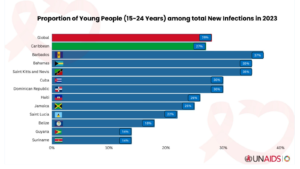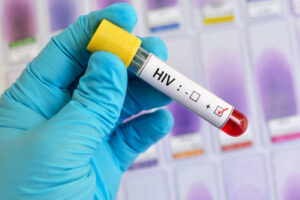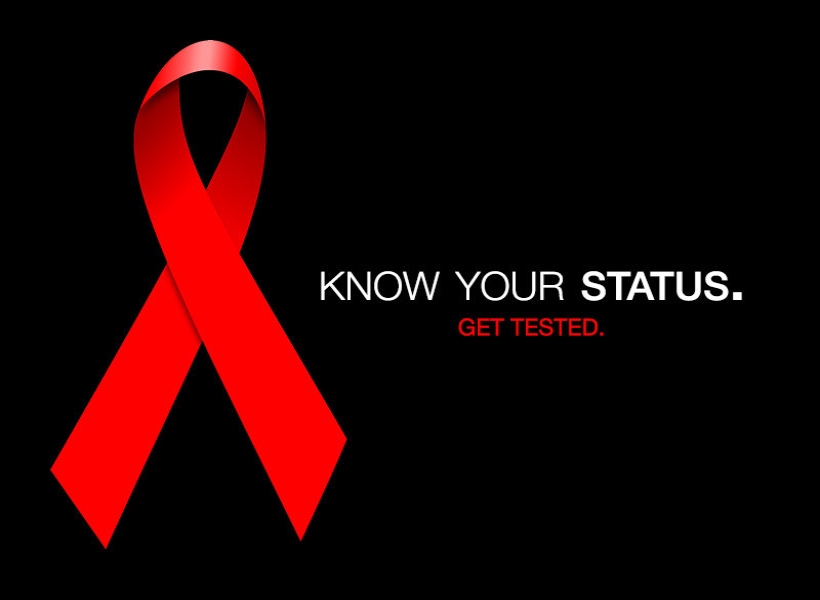The Joint United Nations Programme on HIV/AIDS (UNAIDS)’s Caribbean office has raised alarm regarding a 14 percent increase in reported HIV infections in Guyana in 2023. This alarming trend, it said, contrasts with progress in some areas of the global fight against HIV and signals a critical public health issue that requires immediate and focused attention.
UNAIDS has emphasized that Guyana’s situation must be urgently addressed, particularly in the context of regional and global efforts to control the epidemic and ultimately end AIDS as a public health threat by 2030.
Dr. Richard Amenyah, Director for the UNAIDS Multi-Country Office for the Caribbean, remarked that the situation among young people remains critical. “HIV among young people remains a significant public health concern because the decline in new HIV infections among adolescents and youth has not been rapid enough to effectively control the epidemic.”
Globally, young people aged 15-24 accounted for 28 percent of new HIV infections in 2023. The Caribbean, home to an estimated 15,000 new HIV infections in 2023, has seen a disproportionate impact on its youth population. UNAIDS reported that structural barriers such as social norms, policy issues, and limited healthcare services contribute to the ongoing rise in cases.
In countries like Barbados, where 37 percent of new infections are among youth, the situation is dire. Other countries like the Bahamas and Saint Kitts and Nevis also reflect similarly high proportions, with 35 percent of new cases found among individuals aged 15 to 24.
“This rising proportion of total HIV incidence among young people, which ranges from 14 percent in Suriname and Guyana to 37 percent in Barbados, is concerning and warrants further investigation and serious attention if we are to end AIDS as a public health threat by 2030,” Dr. Amenyah noted.
Guyana, while ranking lower in comparison, is not immune to these regional trends. The report noted that the country’s rise in total HIV cases is driven by several factors, including high-risk sexual behaviors, a lack of comprehensive sexuality education, and widespread myths and misconceptions about the virus.
The UNAIDS report further highlighted that globally, 2.38 million children and adolescents aged 0 to 19 years were living with HIV at the end of 2023. Out of the 630,000 people who died from AIDS-related illnesses that year, 14 percent (90,000) were under the age of 20. Although early diagnosis and treatment have improved survival rates among children, adolescents remain disproportionately affected.
In the Caribbean and other regions like East Asia and Latin America, boys accounted for two-thirds of new adolescent infections. This imbalance, UNAIDS noted, is driven by social stigma, gender inequality, and a lack of comprehensive education about HIV prevention. In Guyana, marginalized populations, particularly those involved in sex work, are at higher risk of contracting the virus.
Young women, in particular, are often at a disadvantage due to power imbalances in sexual relationships, early sexual debut, and the prevalence of gender-based violence. UNAIDS also stressed that the mental health of young people living with HIV is an overlooked issue, as many adolescents face isolation, anxiety about their future, and fears of stigma and discrimination.
Despite advances in HIV prevention and treatment, structural barriers in healthcare and education persist according to UNAIDS which identified a lack of youth-friendly services as a key obstacle to controlling the epidemic among young people. Many adolescents in Guyana and across the Caribbean lack access to confidential, non-judgmental healthcare services that cater to their specific needs. Moreover, poor care-seeking behaviors, compounded by misinformation, prevent many from seeking treatment.

As Guyana faces this critical moment, UNAIDS recommends several tailored strategies to tackle the epidemic among its youth population. These include integrating comprehensive sexual education in the curriculum, and improving access to youth-friendly health care services, especially in rural areas. UNAIDS also stresses the importance of involving young people directly in the design and implementation of HIV programmes to ensure their voices are heard and their needs met.
“Young people must be empowered as leaders in the HIV response,” the report stated. This empowerment, according to UNAIDS, can come through capacity-building initiatives like youth advisory boards and peer-led interventions.
Ultimately, UNAIDS has called on the Guyanese government and other policymakers to address the legal and policy bottlenecks preventing young people from accessing necessary HIV services. UNAIDS advised increased investments in health services and programs designed specifically for adolescents, focusing on the most vulnerable populations.













